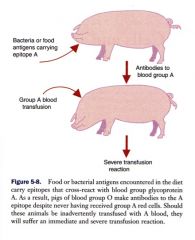![]()
![]()
![]()
Use LEFT and RIGHT arrow keys to navigate between flashcards;
Use UP and DOWN arrow keys to flip the card;
H to show hint;
A reads text to speech;
9 Cards in this Set
- Front
- Back
|
Define antigen
|
Any foreign substance that can bind to specific lymphocyte
receptors can induce an immune response. |
|
|
What are examples of microbial antigens?
|
Bacterial Antigens
Capsule-`K’ antigen Pili -`F’ antigen Flagellum-`H’ antigen Cell wall-`O’ antigen (Lipopolysaccharide LPS-endotoxin) Exotoxins Viral antigens (endogenous- produced inside the cell) Fungal, Protozoa, Helminth antigens |
|
|
What are examples of nonmicrobial antigens?
|
Food, pollen, snake toxin
Foreign cell-surface antigen Blood transfusion (RBC) Graft rejection (MHC antigen) Autoantigens (autoimmune diseases) autoantibodies directed against self antigens (hormones, myelin, basement membrane) |
|
|
What are the exogenous and endogenous antigens and how do they respond?
|
1) Extracellular (exogenous)–live outside the cell. Most bacteria, fungi
most protozoa, helminths. Humoral immune response 2) Intracellular (endogenous)-live inside the cell: Viruses and intracellular bacteria, protozoa. Cell-mediated immune response. |
|
|
What makes a good and poor antigen?
|
Good antigen:
Foreign protein Complex carbohydrate Molecular weight>1000 daltons Bacterial CpG DNA Structurally stable antigen Degree of foreigness Graft between species Poor antigen: Lipids, simple carbohydrate Mol.wt<1000 d (glucose) Mammalian DNA Highly flexible antigen Self-antigens |
|
|
Define epitope or antigenic determinants
|
A specific region on the surface of an antigen, against which immune responses are directed.
Many epitopes may be present on a large antigen Some are immunodominant epitope (favorite) than others Usually about 4-5 amino acids long. |
|
|
Define hapten. How does it relate to penicillin or poison ivy?
|
A small molecule that cannot initiate an immune response unless first bound to an immunologic carrier molecule (usually a protein).
Pencillin degraded to “penicilloyl” (hapten) binds to albumin- develop allergy to drug. Penicillin is usually degraded to penicilloyl, but depending on host genetics, there may or may not be a response. Poison ivy-resin “urushiol” binds to skin proteins and develops skin rash called allergic contact dermatitis (attacked by lymphocytes). |
|
|
What are cross-reactions? And examples of it along with their implications.
|
Antibodies directed against one antigen may react unexpectedly with an unrelated antigen or react with similar protein in different species.
Antibodies to Yersinia enterocolitica (not harmful) cross-reacts with Brucella abortus in diagnostic test. So Don’t kill the Y.e -infected animal because of false-positive reaction. To confirm yersinia vs brucella you need to run a pcr and add brucella primers to see which it is. Feline infectious peritonitis virus ab (FIP-cats) cross reacts with transmissible gastroenteritis virus (TGE-pigs). FIP is difficult to grow and TGE is easy to grow, so by detecting antibodies to TGE in cats,-diagnose FIP. Both diseases are caused by Coronavirus. |
|
|
Why do different blood types auto-immune react?
|

Because they have already reacted to bacteria or food antigens carrying epitopes similar to or identical to the other blood types.
Why don’t type a auto-attack? Because they would recognize epitope A from the bacteria/food antigen as a self-antigen. They’d find another one to use to react to. |

